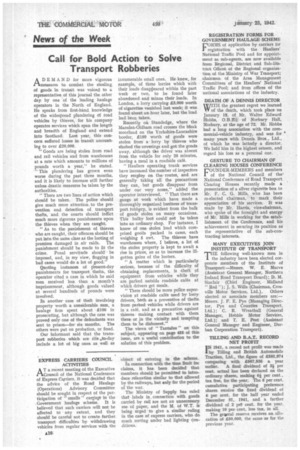Call for Bold Action to Solve Transport Robberies
Page 18

If you've noticed an error in this article please click here to report it so we can fix it.
ADEMAND for more vigorous measures to combat the stealing of goods in transit was voiced to a representative of this journal the other day by one of the leading haulage operators in the North of England. He speaks from first-hand knowledge of the widespread plundering of road vehicles by thieves, for his company operates services which span the length and breadth of England and extend into Scotland. Last year, this concern suffered losses in transit amounting to over £20,000.
" Goods are being stolen from road and rail vehicles and from warehouses at a rate which amounts to millions of pounds worth a year," he stated. " This plundering has grown even worse during the past three months, and it is likely to increase still further unless drastic measures be taken by the authorities.
" There are two lines of action which should be taken. The police should give much more attention to the prevention and detection of transport thefts, and the courts should inflict much more rigorous punishments upon the thieves when they are caught.
" As to the punishment of thieves who are caught, their offences should be put into the same class as the looting of premises damaged in air raids. The punishment should be made to fit the crime. Penal servitude should be imposed, and, in my view, flogging in bad cases would do a lot of good."
Quoting instances of 17i-resent-day punishments for transport thefts, the operator cited a case in which he said men received less than a month's imprisonment, although goods valued at several hundreds of pounds were involved.
In another case of theft involving property worth a considerable sum, a haulage firm spent about £100 in prosecuting, but although the case was proved only one of the defendants was sent to prison—for six months. The others were put on probation, or fined.
Our informant said that the transport robberies which are rife ,,to-day include a lot of big ones as well as innumerable small ones. He knew, for example, of three lorries which with their loads disappeared within the past Week or two, to be found later abandoned and minus their loads. In London, a lorry carrying £3,000 worth of cigarettes vanished last week; it was found about an hour later, but the load had been taken.
Recently on Standedge, where the Marsden-Oldham road crosses the bleak moorland on the Yorkshire-Lancashire border, £150 worth of goods were stolen from a lorry by thieves who slashed the coverings and got the goods away, although the driver was absent from the vehicle for only 20 minutes, having a meal in a roadside café.
" Hauliers operating trunk services have increased the number of inspectors they employ on the routes, and are generally taking all the precautions they can, but goods disappear from under our very noses," added the operator interviewed. " That there are gangs at work which have made a thoroughly organized business of transport robbery, is evident from the bulk of goods stolen on many occasions. This bulky loot could not be taken into an ordinary shop. For instance, I know of one stolen load which comprised goods packed in cases, each weighing 5 cwt. The thieves have warehouses where, I believe, a lot of the stolen property is kept to await a rise in prices, so as to increase the illgotten gains of the looters.
" A matter which is particularly serious, because of the difficulty of obtaining replacements, is .theft of equipment from vehicles while they are parked outside roadside cafés at which drivers get meals.
" There should be more police supervision at roadside cafés used by lorry drivers, both as a preventive of thefts from parked vehicles while drivers are in a cafe, and as a precaution against thieves making contact with them there or in the vicinity and tempting them to be dishonest."
The views of " Tantalus " on this subject, appearing on page 455 of this issue, are a useful contribution to the solution of this problem.
























































